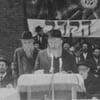This May marks our 13th year in Israel, our Bar Mitzvah year. From the moment that we stepped off the EL AL plane and took our first steps on Israeli soil, we felt that we arrived home to new beginnings.
My husband and I had talked about making Aliyah [moving to Israel] for years. We visited the Aliyah office of The Jewish Agency and spoke several times to different representatives of the agency that help you process your application. There always seemed to be a reason or maybe an excuse why this year was not right.
Time passed quickly, after high school, our oldest daughter came to Israel to spend a year studying Judaism. She planned to stay for one year and then return to Toronto to go to university. But she never left. Our younger daughter followed two years later. Both girls fell in love with the country and decided that they didn't want to come back to Canada. Israel was going to be their home. Each of our daughters met their Israeli husbands. We made two weddings in Israel and the girls settled down. By the time our third grandchild was born, my husband and I knew that our place was in Israel.
Once the decision was finally made to make aliyah, to move to Israel, the process went very quickly. We filled out our application in December and left Canada in May. Our son, who was going to celebrate his Bar Mitzvah in September, wanted to make sure that he was called to the Torah for his Bar Mitzvah at the Western Wall. His wish came true.
Living in Israel as new immigrants is an experience in itself. We were warned that the bureaucracy would be extremely difficult. It was, but we took it in stride. Our first experience with bureaucracy was at the Passport Control Office at the airport. As new immigrants, we needed to receive a Tuedat Olah, the legal certificate that we immigrated. The clerk typed up our information, but instead of writing country of origin Canada, she wrote country of origin Soviet Union. When we pointed out her mistake, she refused to correct it, but instead told us that we had to go to a ministry office in Jerusalem. We later found out that a plane load of Russian Jews had landed a couple of hours earlier and the clerk was just used to typing Soviet Union.
Learning to speak Hebrew was another experience. We joined an intensive language course, an ulpan, for new immigrants in Jerusalem and went everyday for a few months. My husband learnt to speak very quickly, I didn't. Even today, I speak in English whenever possible, as my language skills are poor. Israelis love to speak English. After three months in school, our son was speaking Hebrew like a native.
Coming from Canada, we exchanged our large hi-rise apartment for a small 60 meter two bedroom Kibbutz house in Gush Etzion, near Jerusalem. Our daughters and sons-in law surprised us by cleaning and furnishing the house with kibbutz furniture so that we wouldn't walk into an empty house. Our three year old grandson drew a 'welcome home' picture and hung it on the front door. At first, it was a little difficult living in a small house. We were always under each others feet, but after a few days we found our own space.
On a kibbutz, everything is done communally. We ate lunch in the communal dining room and used the kibbutz laundry service. The novelty of just throwing the laundry into the correct baskets and picking it up the next day, clean and pressed was exciting.
Our older daughter and son-in-law also live on the kibbutz. That is why we chose this kibbutz as our first Israeli home.
Celebrating Shabbat in the communal dining room with more than one hundred other people was an experience. Singing together Shalom Aleichem, the song for welcoming the Shabbat, and many other Shabbat songs, the sounds of young children laughing and running around, made the Shabbat meal a true kibbutz experience! Each family had its own table. There was a rotation system between the kibbutz members and every Shabbat several members took turns setting the tables, serving and cleaning up. As our young grandchildren became a little older, it was not unusual for them to bang on our door early Shabbat morning, looking for chocolate milk and Shabbat cake. For some reason, the milk and cake tasted better in Saba and Safta's (Grandma and Grandpa's) house than theirs. We planned to live on the Kibbutz for a year or two, but instead stayed for six years.
Today we live in Netivot which is in the Northern Negev. The original biblical city of Netivot, where Abraham our forefather lived is about 3 km. from here.
In our city and in many other cities and communities in Israel, ten or fifteen minutes before Shabbat, beautiful Shabbat music is played over the city loudspeakers. When the Shabbat siren is sounded, a serene atmosphere takes over and I go and light my Shabbat candles. For me, the moments before Shabbat are a special time.
To my family, living in Israel is an honor and privilege. We are living in our Jewish homeland and fulfilling our dreams.









Join the Discussion